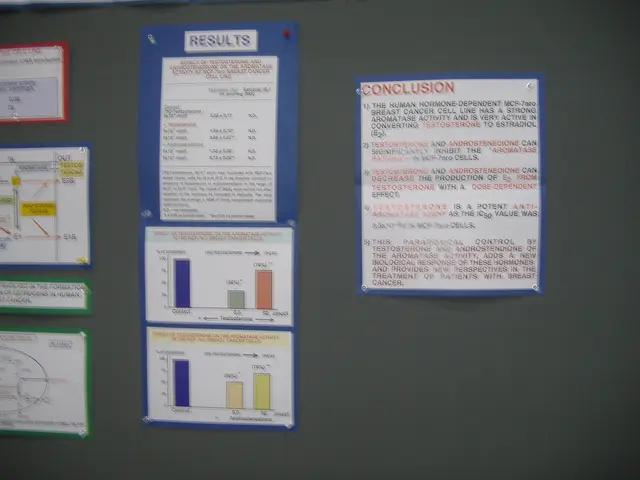EU-US trade agreement disappoints, leading to a decline in German economic optimism
The recently finalized EU-US trade deal, introduced in July 2025, has set off a wave of changes across the Eurozone, particularly affecting Germany's export-oriented industries. The deal, which imposes a 15% tariff on most EU goods entering the U.S., has both challenges and opportunities hidden within.
Impact on the German Economy
The tariff on sectors like automotive and machinery is expected to have a negative impact on Germany's export-oriented industries. However, a reduction from the initially announced 25% rate offers some relief. Sectors exempted from the tariffs, such as semiconductors and green energy, are likely to benefit, while others will face increased pressure.
German economic sentiment has taken a hit due to concerns over the deal's impact on key industries. Despite a high PMI in August 2025, the economic sentiment in Germany dropped sharply, with a decline of 18 points to 34.7.
Impact on Other Eurozone Industries
The European Central Bank (ECB) forecasts a Eurozone GDP growth of 1.1% for 2025, indicating that while the trade deal presents short-term challenges, it also provides long-term stability. The deal creates opportunities for targeted investments in sectors like cybersecurity and energy transition, particularly in Southern Europe.
The automotive sector across Europe, including Germany, is likely to remain under pressure due to the higher-than-pre-2025 tariffs.
Overall Impact on Eurozone Growth
The EU-US trade deal reduces policy uncertainty and mitigates the risk of further tariff hikes, which could have been more detrimental to Eurozone growth. Despite sector-specific challenges, the agreement offers opportunities for strategic diversification into sovereignty-linked sectors and geographic rebalancing, which can support long-term growth.
Sentiment Across the Eurozone
Sentiment across the eurozone mirrored Germany's decline, with the ZEW Indicator of Economic Sentiment falling short of expectations for a more modest retreat. The ZEW expectations index for the eurozone dropped 11 points to 25.1, and the gauge for current conditions also deteriorated, slipping to -68.6 from -59.5 a month earlier.
Financial market experts have expressed disappointment with the announced EU-US trade deal, with some describing it as a one-sided agreement aimed at reducing the US trade deficit with the EU. The market reaction to the ZEW release was muted, with Germany's DAX index remaining broadly steady and the euro dipping slightly.
Economist Bill Diviney at ABN Amro considers the agreement a result of Europe's weak bargaining position due to economic stagnation and rising inflation pressures. Oliver Rakau, chief Germany economist at Oxford Economics, considers the agreement a clear win for the US politically.
Money markets continue to price in an 85% probability of a 25-basis-point rate cut by the Federal Reserve at its next meeting. The gauge of current conditions for the eurozone fell by 7 points.
In summary, while the EU-US trade deal presents challenges, particularly for export-heavy industries, it also stabilizes trade relations and offers opportunities in sectors protected by exemptions or strategic investments.
The Eurozone's financial market experts have expressed disappointment with the announced EU-US trade deal, categorizing it as a one-sided agreement primarily aimed at reducing the US trade deficit with the EU. This sentiment is mirrored across the eurozone, as evidenced by the ZEW Indicator of Economic Sentiment falling short of expectations in both the eurozone and Germany.
The deal has potential implications for the general-news landscape, with some financial market experts attributing Europe's weak bargaining position to economic stagnation and rising inflation pressures. This could potentially lead to further discussions and policy changes within the realm of politics, particularly in relation to the Eurozone's business sector and overall economy.




